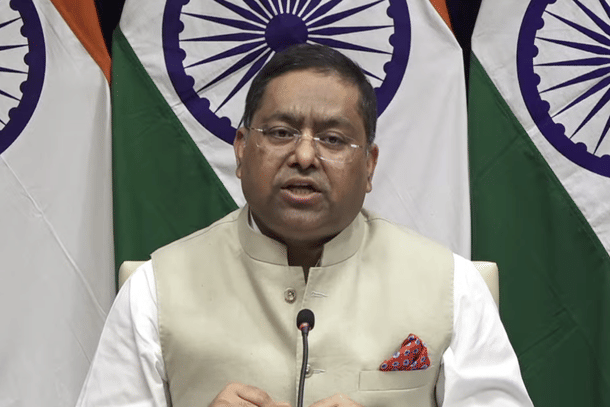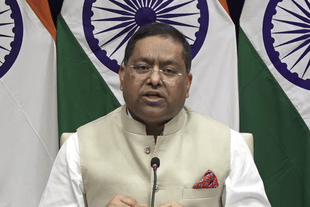News Brief
'Driven By Vote Bank Considerations': India Rejects 'Deeply Biased' US Religious Freedom Report
Kuldeep Negi
Jun 28, 2024, 05:41 PM | Updated 05:41 PM IST
Save & read from anywhere!
Bookmark stories for easy access on any device or the Swarajya app.


The Ministry of External Affairs (MEA) has strongly condemned the US State Department's report on international religious freedom, terming it as "deeply biased" and lacking in understanding of the country's social fabric.
In a press briefing on Friday (28 June), MEA Spokesperson Randhir Jaiswal said, "We have noted the release by the US State Department of its report on international religious Freedom for 2023. As in the past, the report is deeply biased, lacks an understanding of India's social fabric, and is visibly driven by vote bank considerations and a prescriptive outlook. We therefore reject it".
The 2023 Report on International Religious Freedom was released on Wednesday (26 June) by US Secretary of State Antony Blinken.
Releasing the report, Blinken said, “Today, governments around the world continue to target individuals, shutter places of worship, forcibly displace communities, and imprison people because of their religious beliefs".
On India, Blinken remarked, “In India, we see a concerning increase in anti-conversion laws, hate speech, demolitions of homes and places of worship for members of minority faith communities.”
In the press briefing on Friday, Jaiswal further criticised the report for being a mix of "imputations, misrepresentations, selective usage of facts, reliance on biased sources, and a one-sided projection of issues."
Jaiswal noted that the report misrepresented India's constitutional provisions and laws, selectively picked incidents to advance a preconceived narrative, and questioned the validity of laws and regulations enacted by Indian legislatures.
The report also appears to challenge the integrity of certain legal judgments given by indian courts, Jaiswal added.
"The report has also targeted regulations that monitor the misuse of financial flows into India, suggesting that the burden of compliance is unreasonable. It seeks to question the need for such measures. On its own part, the United States has even more stringent laws and regulations and would surely not prescribe such solutions for itself," he added.
Jaiswal said that human rights and respect for diversity have been and remain a legitimate subject of discussion between India and the United States.
He added that in 2023, India officially raised numerous cases of hate crimes, racial attacks on Indian nationals and other minorities, vandalisation and targeting of places of worship, and violence and mistreatment by law enforcement authorities in the US.
Further, the issue of according political space to advocates of extremism and terrorism abroad was also raised, he said.
"However, such dialogue should not become a license for foreign interference in other polities," Jaiswal added.
Also Read: Deputy NSA Vikram Misri, 1989-Batch IFS Officer, To Be New Foreign Secretary
Kuldeep is Senior Editor (Newsroom) at Swarajya. He tweets at @kaydnegi.





